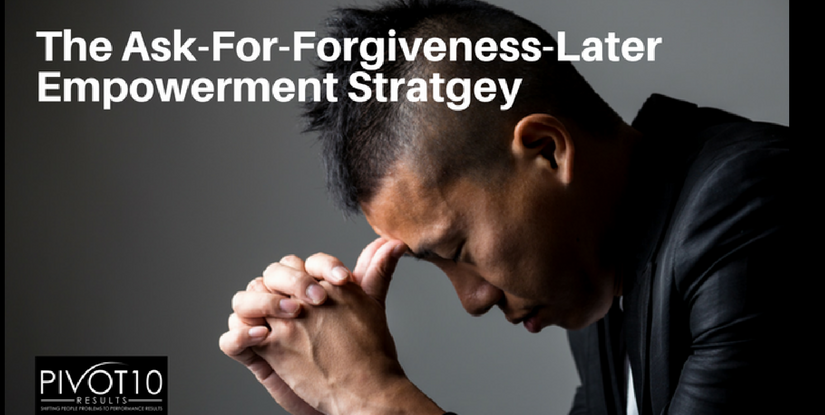This is Part 2 of a series about: “What I Learned at Zappos Culture Camp”
By Gina Trimarco
What inspired me the most about spending time at Zappos Culture Camp was witnessing empowerment in action. Their employees make decisions almost without thinking twice, as if it were an innate skill to respond quickly in the moment … kind of like improv.
Here’s an example …
Zappos Customer: “The box arrived without my shoes in it.”
Zappos Customer Loyalty Rep: “So sorry about that. I’ll send you another pair. Oh, wait, that exact pair is out of stock, but I see the Macy’s near your house has them. I’ll refund you for your transaction and give you free shipping on future purchases.”
This is a real transaction I witnessed in person at Zappos headquarters. In a matter of seconds, the employee managed to juggle multiple computer screens to solve the customer’s problem, including searching for shoes from a “competitor” while attempting to create the best experience, as well as a P.E.C. – a “personal emotional connection” (something she was trained to do).
When the employee got off the phone one of my fellow campers asked her, “How do you know she’s not lying to you?” The employee shrugged her shoulders and said that it wasn’t her place to question it. She could see the customer’s buying behaviors in the history of her account and nothing indicated that the customer would be making up a story. Period. End of story.
Another call came in about a potential fraudulent transaction. The employee quickly connected her to someone who could assist her. We then asked why she didn’t spend time doing the P.E.C. thing and she said,
“When it comes to people’s money I want to make sure their situation is handled right away. They’re not feeling like making a personal connection with me in that moment.”
Again, done flawlessly without a drop of sweat or fear.
Some companies think and say that they empower their employees but frankly “talk is cheap”. In various training situations with clients we have heard over and over again from employees:
“What exactly are we empowered to do?”
Meanwhile managers would say: “We empower them. They won’t take initiative.”
Instant frustration ensues in these types of cultures due to miscommunication, plus no real strategy around the power of empowerment.
Empowerment is a philosophy AND a practice that requires mentoring and coaching. Empowering people takes time and training.
At Zappos they have a few mantras that are relevant to empowerment:
- Inspire employee happiness and engagement to WOW your customers
- Give power to your people to use their best judgement
- Make it clear what output is expected to give them more freedom to solve problems
Common sense concepts, in my opinion. And while not everyone subscribes to the concept of employee happiness, it works. No one wants to deal with or be around unhappy and negative people. It’s not a productive situation. Without productivity there’s no profits.
While I totally support creating an empowered environment, I was fascinated and curious about how they make it work, especially since so many of my colleagues have said, “In the real world, that’s just not possible [what Zappos does].”
I continued to ask different employees the same two questions:
- How did you adjust to having a job where you could make decisions without being in fear of making wrong decisions?
- How do you manage employees who make wrong decisions?
To summarize the answers, it comes down to trust and communication. As employees practice making decisions on their own, a trust develops within themselves and with their leaders. Kind of like a Pavlovian conditioning. I equate it to being rewarded by not being reprimanded. The more they’re “rewarded”, the more they trust themselves to make good decisions. They also have a number of resources at their disposal if they have doubts or don’t know what to do.
Then there’s the training component. Training is about nine weeks, all total. In the first five weeks before “graduation” employees are still considered to be in the interview phase. They are offered money to leave after the first five weeks if they’re not feeling they’re a good fit. The last four weeks they’re on their own while someone listens to their calls, thus giving them many weeks of coaching and mentoring. And ALL employees go through the same training even if they weren’t hired for the Customer Loyalty Team (call center).
For “managers” (called Lead Links since no one has job titles as everyone “self-organizes”), their roles are to give feedback and mentorship, thus active communication about effective decision making. They also convey the message of “it’s not your money, don’t worry about it”. Can you imagine that in your company?! They also give positive reinforcement for making decisions while maintaining a philosophy of “ask for forgiveness, not permission.”
In summary, they preach “Coach Up, Not Out”. What a concept!
What are Zappos employees empowered to do, you wonder?
For one, there’s no set monetary budget for handling customer situations. They can give gifts, like sending flowers, or coupons or refunds. Whatever they think is best for fulfilling the company’s purpose of creating the best customer experience.
In summary, empowerment requires:
- Purpose
- Training
- Power/Authority
- Trust
- Communication
- Mentorship
- Resources
One of my favorite moments is when one of the trainers explained how they use improv training to help train employees in all of these areas! I’m a little biased of course since that’s one of the tools we use in training.
In the words of one of their trainers: “Your delicious brain is the best tool.”
Empower your people to use their delicious brains and grow your business!
What are you doing to be a Culture Builder instead of a Culture Killer?
We have tools to help you build and evolve. Reach out to me to learn more at gina@pivot10results.com.
If you’re feeling stuck, it’s time to pivot!
-Gina
P.S. Part 3 of this series coming next week is “Creating Customer Experiences Instead of Transactions”
ABOUT THE POST AUTHOR
Gina Trimarco, Chief Results Officer, knows how to pivot to profits from problems and find joy through the process. Her philosophy is that performance pays and people need to be trained to perform on the stage of business to achieve results.
pivot to profits from problems and find joy through the process. Her philosophy is that performance pays and people need to be trained to perform on the stage of business to achieve results.
Gina successfully pivoted her coaching firm, Gina & Company, into the new Pivot10 Results, a training and development company that helps business teams to quickly adapt their communications and engagement skills in leadership, customer and sales to achieve results by providing them experiential learning tools and strategies.




